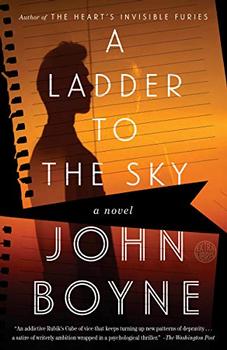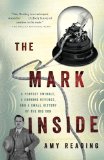Summary | Excerpt | Reviews | Beyond the book | Read-Alikes | Genres & Themes | Author Bio

America's Most Dangerous Huckster, the Man Who Pursued Him, and the Age of Flimflam
by Pope BrockA fake doctor who slices off goat testicles and inserts them
into the scrotums of men looking to restore their desiccated virility? A fake
doctor who grows fabulously wealthy from the hordes lined up outside his door,
despite the fact that his surgery causes blood poisoning, loss of limbs, and
even death? Preposterous! If Charlatan were a novel, it would be a
satire. If it were a play, it would be a farce. But it is history, and we must
ruefully own up to it as our legacy. If we try to tell ourselves that nowadays
we are far too enlightened to succumb to such quackery, we are as fraudulent as
the "surgical swami" himself. After all, how different are Botox injections, the
same toxin that causes botulism, from goat glands? John Brinkley's story
promises to tell us much about the modern confection of advanced knowingness and
undaunted gullibility, not to mention our deep investment in eternal youth.
Pope Brock opens up Brinkley's life with the same gusto with which Brinkley
opened up his patients. Brinkley's work dripped with blood; Brock's work drips
with irony. He is fully alive to the absurdities and serendipities of his story.
Brinkley's life work came to him one day when a woebegone farmer pleaded for a
cure to his impotence. Brinkley admitted that he had no cure and glumly the two
men stared out the window to the farm beyond. "Too bad I don't have billy-goat
nuts," the farmer mused. Flash forward to the farmer's wife giving birth to a
strapping baby boy—named Billy. Thousands of operations later and "richer than a
créme brûlée,"
Brinkley found himself hounded by Morris Fishbein, editor of the Journal of the
American Medical Association, for advertising his medical services, the only
crime for which the AMA could indict him. For Brinkley, there was only one thing
to do: shout louder. He established his own radio station so he could proclaim
the good word about goat glands far and wide, and in the process he invented
much of the AM format we know today and helped refine what we know as public
relations. Brock notes dryly, "For some time Brinkley had been noticing the
resemblance between himself and the Son of God." Brinkley mixed self-advertising
with religious proselytizing, somehow managing not to collapse under the
contradiction of being "the most unusual scientist-fundamentalist in the whole
world." As his radio audience grew, Brinkley took the logical next step—he ran
for governor, twice, and almost won. The larger his successes, the more
inevitable became a showdown with Fishbein, and the book ends with a courtroom
drama at which both men staked their careers.
From Sigmund Freud to H.L. Mencken, Brinkley's showmanship branched into many
streams of popular culture, and Brock frequently departs from the main plot to
explore little eddies such as William Butler Yeats' "ligation of the vas"—a
vasectomy—which he underwent in the hopes of increased sexual prowess, or the
start that Brinkley's radio station gave to "The Original Carter Family" and the
dramatic night that Sara Carter, singing next to her husband, A.P., dedicated a
song to her lover in California in the hopes that he was listening to the
broadcast and would come rescue her. Along the way, Brock backlights a stubborn
anti-scientific mindset in American culture, from the early nineteenth century
when the Jacksonian celebration of the common man led to widespread suspicion of
doctors and their elite education, to the early twentieth century when
scientific advancements such as sonar and quantum physics were as incredible as
the claims made by charlatans. He points out, "Strapping a metal contraption on
one's head to cure stuffy nose, drinking radium as a cure for cancer, it all fit
with the logic of modern life."
Though he is unafraid of a good clichè, Brock's sardonic style mostly serves
his subject well. He is an engaging raconteur who unfurls his narrative with
fleet confidence. But his tone raises a larger question: how are we readers
supposed to feel toward Brinkley? Brock renders him as a lovable quack, someone
we can't help but admire for his moxie. He even goes so far as to argue that
"great blunderers like these have a place in the history of science. Wrong, they
helped point the way for others to be right. They fought as bravely for error as
more fortunate prophets fought for the truth. In science, as in love, it is
sometimes extraordinarily hard to draw the line between faith and folly." But
it's worth pointing out (as Brock glancingly does at the end) that the man was
essentially a serial killer with a body count well into the dozens. Might a more
critical or analytical viewpoint have revealed a deeper dimension to Brinkley's
vastly entertaining story?
Alas, the subtitle's promise to explore—or even define—the Age of Flimflam
goes unfulfilled. By remaining so fully under the sway of Brinkley's charismatic
personality, Brock fails to probe the psychology of Brinkley's patients, thus
bypassing the opportunity to generate a larger theory about the persistence of
snake oil in an era of scientific progress. Charlatan thus bears a
certain similarity to the nostrums peddled by quacks like Brinkley: it does
nothing to cure the disease—unremitting gullibility—for which it is prescribed,
but it goes down in a nice, quick gulp with an altogether pleasing sensation.
![]() This review was originally published in The BookBrowse Review in February 2008, and has been updated for the
January 2009 edition.
Click here to go to this issue.
This review was originally published in The BookBrowse Review in February 2008, and has been updated for the
January 2009 edition.
Click here to go to this issue.

If you liked Charlatan, try these:

by John Boyne
Published 2019
A seductive, unputdownable psychodrama following one brilliant, ruthless man who will stop at nothing in his pursuit of success.

by Amy Reading
Published 2013
Amy Reading's fascinating account of con artistry in America and Frank Norfleet's wild caper invites you into the crooked history of a nation on the hustle, constantly feeding the hunger and the hope of the mark inside.
Your guide toexceptional books
BookBrowse seeks out and recommends the best in contemporary fiction and nonfiction—books that not only engage and entertain but also deepen our understanding of ourselves and the world around us.